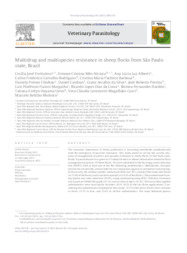Multidrug and multispecies resistance in sheep flocks from São Paulo state, Brazil.
Multidrug and multispecies resistance in sheep flocks from São Paulo state, Brazil.
Author(s): VERÍSSIMO, C. J.; NICIURA, S. C. M.; ALBERTI, A. L.; RODRIGUES, C. F. C.; BARBOSA, C. M. P.; CHIEBAO, D. F.; CARDOSO, D.; SILVA, G. S. da; PEREIRA, J. R.; MARGATHO, L. F. F.; COSTA, R. L. D. da; NARDON, R. F.; UENO, T. E. H.; CURCI, V. L. L. M.; MOLENTO, M. B.
Summary: The economic importance of sheep production is increasing worldwide simultaneously with the emergence of parasitic resistance. This study aimed to survey the current situation of management practices and parasite resistance in sheep flocks in São Paulo state, Brazil. A questionnaire was given to 35 sheep farmers to obtain information related to flock management practices. Of these flocks, 30 were submitted to the fecal egg count reduction test (FECRT) with at least one of the five following anthelmintics: albendazole, closantel, ivermectin, levamisole, and moxidectin, for comparison against an untreated control group. In the survey, the median number animals per flock was 301, mainly of the Santa Ines breed (in 75.8% of the flocks) and crossbred animals (in 54.5% of the flocks). The predominant farming system was semi-intensive (82.9%), using rotational grazing (80%). Selective treatment was based on FAMACHA grade (47.1%) and in clinical signs (41.2%). The most often applied anthelmintics were macrocyclic lactones (42.9?54.2% in the last three applications). Considering the anthelmintics employed in this study, 10.7% of the farms? flocks were resistant to three, 35.7% to four, and 53.6% to all five anthelmintics. The main helminth genera observed before and after treatments were Haemonchus sp. (75.8%) and Trichostrongylus sp. (19.1%), but all observed genera (Cooperia sp., Oesophagostomum sp., and Strongyloides sp.) were detected by the FECRT. Considering efficacy values less than or equal to 90% in the FECRT as resistant, 100% of flocks were resistant to albendazole and ivermectin, 96.6% to moxidectin, 92.9% to closantel, and 53.6% to levamisole. It is thus possible to conclude that multidrug resistance is widespread in sheep flocks in São Paulo state, Brazil, and this involves all prevalent helminth genera.
Publication year: 2012
Types of publication: Journal article
Observation
Some of Embrapa's publications are published as ePub files. To read them, use or download one of the following free software options to your computer or mobile device. Android: Google Play Books; IOS: iBooks; Windows and Linux: Calibre.
Access other publications
Access the Agricultural Research Database (BDPA) to consult Embrapa's full library collection and records.
Visit Embrapa Bookstore to purchase books and other publications sold by Embrapa.

